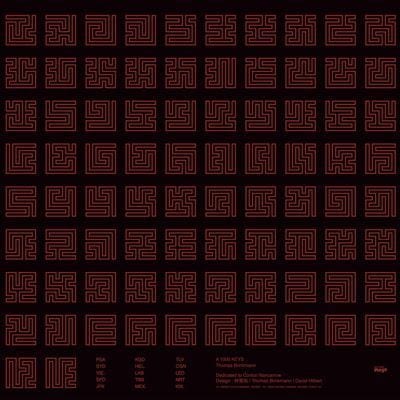
Thomas Brinkmann’s A 1000 Keys is conceptual through-and-through. It is a recording experiment, and like most musical experiments, it needs to be judged by a different set of merits. Does the music sound fresh, or does it remind you of something else? Does the music sound impressive merely from an experimental point of view, or is it compelling in other ways? Do you get chills or do you just get confused? No matter how open-minded a listener you are when it comes to avant-garde electronics or musique concrète, A 1000 Keys is still going to put up a fight. I’ve certainly enjoyed Brinkmann’s work in the past, but this new musical experiment nearly gets outperformed by its own press release.
Normally, drawing more than just a little cursory attention to a press release is a little unnecessary for a review, but the one for A 1000 Keys displays a certain disconnect that’s worth noting. All 18 tracks (15 for vinyl purchasers) are made up of strokes from a grand piano cooked up through a binary code. The music is just as clinical as the process makes it sound, yet I’m reminded that expressiveness is in the ear of the beholder when I read that this is “a harsh meditation on the expressive qualities of digital sound production”. Reading on, that’s fine-tuned to how “Brinkmann sardonically subverts the sensual qualities of this proto-romantic instrument”, portraying “[t]hese functional scenarios” as “sterile passageways for anonymous, objectified masses”. After comparing it to the works of to Arnold Schönberg and Morton Feldman, A 1000 Keys‘s press kit goes on to point out that all tracks are named after “three-letter codes for international airports. Brinkmann refers to non-places that establish their own space-time continuums while lacking individual identity and history”. By this point, there are many things that need addressing. For instance, how is an international airport a non-place? How do they lack identity and history? How do they have their own space-time continuums when they hang clocks everywhere? And why were Heathrow, Winnipeg, and Madrid all ejected from the vinyl edition?
We are here to discuss music, not a press release. But as I stated before, this one is worth quoting because A 1000 Keys‘s description comes with a great deal more prose than the music itself. With 18 tracks clocking in at 76 minutes, it’s entirely too easy to lose focus amongst all the ramshackle rhythms and atonal figures. When Richard D. James attempted a similar experiment, he kept it lean while still adding musical variety. The most interesting thing that Brinkmann conjures up here is “CGN”, which sounds nothing like the other tracks but more like NON’s Ghost In The Machine approach to ambience.
The Editions Mego label has long been good for a conceptually musical challenge for our senses, but A 1000 Keys proves that you can’t nail it cold all the time every time. Sometimes an experiment is just an experiment, and it needs to leave one’s system in order to make room for the good stuff.


![Call for Papers: All Things Reconsidered [MUSIC] May-August 2024](https://www.popmatters.com/wp-content/uploads/2024/04/all-things-reconsidered-call-music-may-2024-720x380.jpg)



